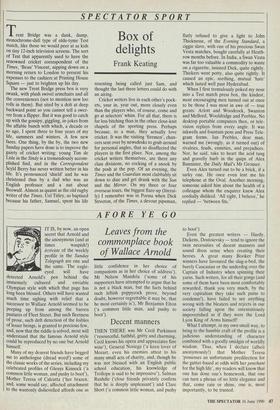SPECTATOR SPORT
Box of delights
Frank Keating
Trent Bridge was a dank, damp, monochrome-dull type of olde-tyme Test match, like those we would peer at as kids on tiny 12-inch television screens. The sort of Test that apparently used to have the renowned cricket correspondent of the Times, 'Beau' Vincent, nipping down on a morning return to London to present his expenses to the cashiers at Printing House Square ŌĆö just to brighten up his day.
The new Trent Bridge press box is very swank, with plush swivel armchairs and all the conveniences (not to mention new loo rolls in them). But sited by a dolt at deep backward point so you cannot tell a swer- ver from a flipper. But it was good to catch up with the gossipy, giggling, in-jokes from the affable bunch with which, a decade or so ago, I spent three to four years of my life, summers and winters. A few new faces. One thing, by the by, the two new Sunday papers have done is to improve the gaiety of cricket writing: young Tim de Lisle in the Sindy is a tremendously accom- plished find, and in the Correspondent Scyld Berry has never written better in his life. It's pronounced 'shield' and he was christened thus by a dad who was an English professor and a nut about Beowulf. Almost as quaint as the old rugby writer of the Times, Uel Titley, so baptised because his father, Samuel, spent his life
resenting being called just Sam, and thought the last three letters could do with an airing.
Cricket writers live in each other's pock- ets, year in, year out, more closely even than the players who, of course, come and go at selectors' whim. For all that, there is far less bitching than in the other close-knit chapels of the sporting press. Perhaps because, to a man, they actually love cricket. It was the visiting 'firemen', chan- cers sent over by newsdesks to grub around for personal angles, that so disaffected the players in the first place. Nor, among the cricket writers themselves, are there any class divisions, no cocking of a snook by the posh at the pop. Of an evening, the Times and the Guardian most clubbably sit down to dine and get drunk with the Sun and the Mirror. On my three or four overseas tours, the biggest flare-up (literal- ly) I remember was in Poona when Dick Streeton, of the Times, a devout pipeman, flatly refused to give a light to John Thicknesse, of the Evening Standard, a ciggie slave, with one of his precious Swan Vesta matches, bought carefully at Heath- row months before. In India, a Swan Vesta was far too valuable a commodity to waste on a cigarette, insisted Dick, quite rightly. Thickers went potty, also quite rightly. It caused an epic, ŌĆó seething, mutual 'hate' which lasted well past Hyderabad.
When I first tremulously poked my nose into a Test match press box, the kindest, most encouraging men turned out at once to be those I was most in awe of ŌĆö true greats: Arlott and Woodcock, Swanton and Melford, Wooldridge and Peebles. No desktop portable computers then, or tele- vision replays from every angle. It was inkwells and fountain pens and Press Tele- gram forms. Ian Peebles, dear man, warned me (wrongly, as it turned out) of rivalries, feuds, enmities, and prejudices. Nor, he said, take to heart the acid tang and gravelly barb in the quips of Alex Bannister, the Daily Mail's Mr Grouser.
Even Alex turned out to be a brick, if a sarky one. He once even lent me his telephone at the Oval. Another morning, someone asked him about the health of a colleague whom the enquirer knew Alex cordially disliked. 'All right, I believe,' he replied ŌĆö 'between fits.'


















































 Previous page
Previous page